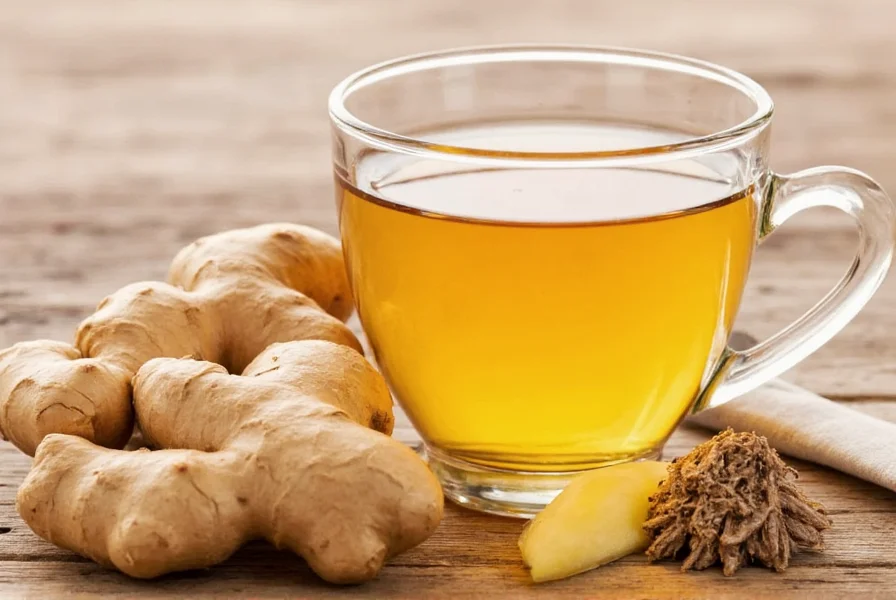Ginger tea has been used for centuries as a natural remedy for digestive discomfort, and modern science increasingly validates these traditional uses. When prepared correctly, this simple beverage can provide measurable relief for common digestive issues without the side effects often associated with pharmaceutical options.
How Ginger Tea Supports Digestion: The Science
Ginger contains bioactive compounds called gingerols and shogaols that interact with your digestive system in several beneficial ways. These compounds stimulate gastrointestinal motility, helping food move more efficiently through your system. They also possess anti-inflammatory properties that can soothe irritated digestive tissues.
A 2020 review published in Nutrients analyzed multiple clinical trials and concluded that ginger significantly accelerates gastric emptying. Participants with functional dyspepsia (chronic indigestion) experienced up to 25% faster stomach emptying after consuming ginger preparations compared to placebo.
Optimal Ginger Tea Preparation for Digestive Benefits
Not all ginger tea preparations deliver equal digestive benefits. The method of preparation affects the concentration of active compounds:
| Preparation Method | Gingerol Concentration | Best For |
|---|---|---|
| Fresh ginger steeped 10+ minutes | ★★★★☆ | Immediate relief from bloating |
| Dried ginger powder | ★★★☆☆ | Daily digestive maintenance |
| Cold-brewed ginger | ★★☆☆☆ | Sensitive stomachs |
| Ginger tea bags | ★☆☆☆☆ | Convenience over potency |
For maximum digestive benefits, use fresh ginger root. Slice or grate 1-2 inches of ginger and steep in boiling water for 10-15 minutes. Longer steeping times increase the concentration of active compounds but may make the tea more pungent.

When to Drink Ginger Tea for Best Results
Timing matters when using ginger tea for digestive support. Research suggests:
- Before meals: Consuming ginger tea 20-30 minutes before eating can prepare your digestive system, potentially reducing post-meal bloating
- After meals: Drinking ginger tea within 30 minutes after eating may accelerate gastric emptying, particularly helpful after heavy meals
- During digestive discomfort: When experiencing nausea or indigestion, ginger tea typically provides relief within 15-30 minutes
Scientific Evidence on Specific Digestive Conditions
Ginger tea shows particular promise for several common digestive issues:
Nausea and Motion Sickness
A comprehensive analysis in the American Journal of Physiology found ginger effective for multiple types of nausea. Unlike many anti-nausea medications, ginger works on both the stomach and brain receptors involved in nausea without causing drowsiness.
Functional Dyspepsia
People with chronic indigestion often experience significant improvement with regular ginger consumption. A clinical trial tracking participants with functional dyspepsia showed 60% reported reduced symptoms after incorporating daily ginger tea for four weeks.
Postoperative Nausea
Research published in Anesthesia & Analgesia demonstrated that patients who consumed ginger before surgery experienced 38% less postoperative nausea compared to the control group.
Who Should Use Caution with Ginger Tea?
While generally safe, certain individuals should moderate their ginger tea consumption:
- People taking blood thinners (ginger has mild anticoagulant properties)
- Those with gallstone disease (ginger may increase bile production)
- Individuals with low blood pressure
- Pregnant women beyond the first trimester should consult their healthcare provider
The recommended daily limit for digestive benefits is 3-4 grams of ginger (approximately 1-2 cups of strongly brewed tea). Excessive consumption may cause heartburn or mouth irritation in sensitive individuals.
Ginger Tea vs. Other Digestive Remedies
Compared to common digestive aids, ginger tea offers unique advantages:
- Peppermint tea: Better for upper digestive tract issues like heartburn, while ginger excels for stomach emptying and nausea
- Probiotics: Works differently—ginger provides immediate symptomatic relief while probiotics address gut microbiome balance over time
- Over-the-counter antacids: Ginger addresses the root cause of slow digestion rather than just neutralizing acid
Creating a Sustainable Ginger Tea Routine
For lasting digestive benefits, incorporate ginger tea consistently:
- Start with one cup daily after your largest meal
- Gradually increase to two cups if well-tolerated
- Consider adding lemon (vitamin C enhances ginger compound absorption)
- Track your symptoms to identify personal response patterns
Many people notice improvement in digestive comfort within 1-2 weeks of regular consumption. Remember that natural remedies work cumulatively and may require consistent use for optimal results.
Frequently Asked Questions
How quickly does ginger tea work for digestion?
Ginger tea typically begins working within 15-30 minutes after consumption. The active compounds start stimulating gastric motility almost immediately, with most people experiencing reduced bloating or nausea within half an hour. For chronic digestive issues, consistent daily use over 2-4 weeks yields the most significant improvements.
Can ginger tea help with IBS symptoms?
Research suggests ginger tea may help certain IBS symptoms, particularly nausea and abdominal discomfort. However, it's not universally effective for all IBS types. People with IBS-D (diarrhea-predominant) should use ginger cautiously as it may increase bowel motility. Those with IBS-C (constipation-predominant) may benefit more from ginger's digestive stimulating effects.
What's the best time to drink ginger tea for bloating relief?
For bloating relief, drink ginger tea 20-30 minutes before meals to prepare your digestive system, or within 30 minutes after eating to accelerate gastric emptying. If experiencing acute bloating, drink a cup of strong ginger tea and wait 15-20 minutes for relief. Consistent daily consumption yields better long-term results than occasional use.
How much fresh ginger should I use for digestive benefits?
For optimal digestive benefits, use 1-2 inches (2.5-5 cm) of fresh ginger root per cup of water. Grate or thinly slice the ginger to maximize surface area, then steep in boiling water for 10-15 minutes. This provides approximately 1-2 grams of ginger per cup, within the recommended daily limit of 3-4 grams for digestive support.
Can I drink ginger tea every day for digestion?
Yes, you can safely drink ginger tea daily for digestive support, with a maximum of 3-4 grams of ginger (about 2-3 cups of strongly brewed tea) per day. Long-term studies show no significant adverse effects at these levels. However, take periodic breaks (one week off per month) to maintain effectiveness and prevent potential mild stomach irritation from continuous use.











 浙公网安备
33010002000092号
浙公网安备
33010002000092号 浙B2-20120091-4
浙B2-20120091-4